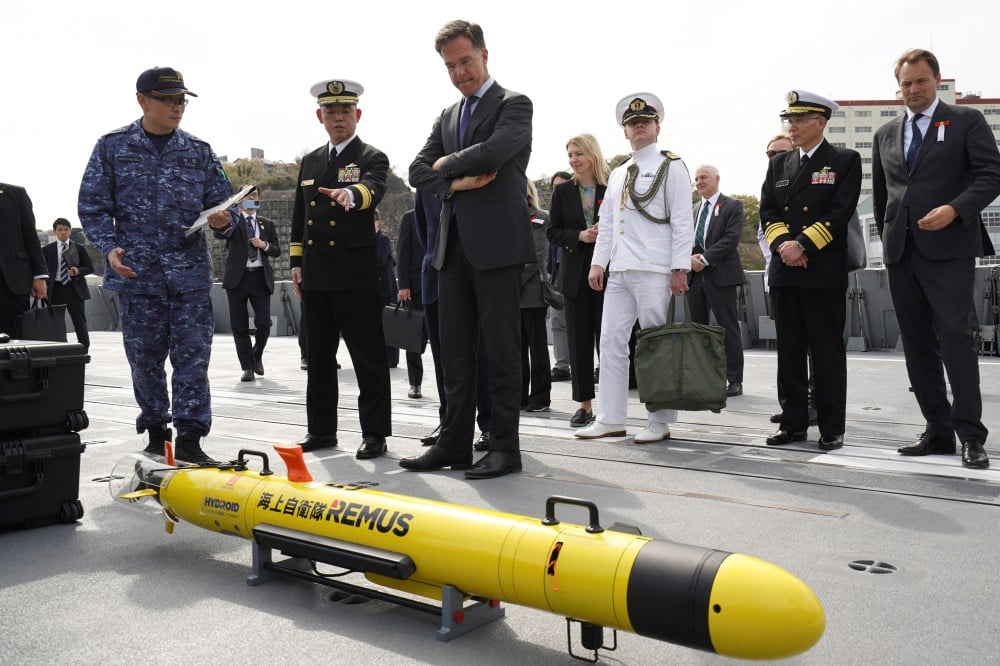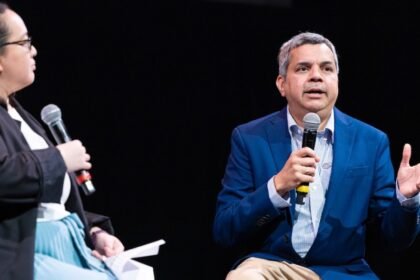The much-anticipated NATO summit in The Hague in late June accomplished its core objectives: securing a 5 percent defense pledge, managing U.S. President Donald Trump, and reaffirming a commitment to collective security. But the summit also drew criticism for sidestepping or neglecting hard questions.
Among the hard but crucial questions left unaddressed was NATO’s engagement with the Indo-Pacific. Forging deeper relations with the alliance’s regional partners, known as the Indo-Pacific Four (IP4)—Australia, Japan, New Zealand, and South Korea—will be critical to NATO’s ability to counter growing cross-regional threats to Euro-Atlantic security. Absent refocused attention, these relationships risk being undermined by unconstructive and erratic U.S. policy.
The much-anticipated NATO summit in The Hague in late June accomplished its core objectives: securing a 5 percent defense pledge, managing U.S. President Donald Trump, and reaffirming a commitment to collective security. But the summit also drew criticism for sidestepping or neglecting hard questions.
Among the hard but crucial questions left unaddressed was NATO’s engagement with the Indo-Pacific. Forging deeper relations with the alliance’s regional partners, known as the Indo-Pacific Four (IP4)—Australia, Japan, New Zealand, and South Korea—will be critical to NATO’s ability to counter growing cross-regional threats to Euro-Atlantic security. Absent refocused attention, these relationships risk being undermined by unconstructive and erratic U.S. policy.
NATO’s partnerships with the IP4 have progressed steadily since 2022. At the Madrid summit that year, the leaders of all four countries were invited to attend for the first time. Their presence signaled growing alignment, notably around NATO’s new strategic concept, which identified China as posing “systemic challenges” to Euro-Atlantic security. In 2023, the alliance formalized ties with the IP4 at the Vilnius summit by signing Individually Tailored Partnership Programs (ITPPs)—a key mechanism for structured cooperation with nonmembers.
By the 2024 Washington summit, NATO had moved toward operationalizing IP4 engagement. Several initiatives were launched, including support for Ukraine’s military health care, cooperation on cyber defense and initiatives to counter disinformation, and joint work on responsible military uses of artificial intelligence.
The logic of this engagement is clear. While NATO’s area of responsibility is the North Atlantic, threats from the Indo-Pacific—ranging from unlawful and coercive Chinese actions in the South China Sea to North Korean arms transfers and troop deployments to Russia—have direct consequences for Euro-Atlantic security. Stronger Indo-Pacific partnerships are essential for confronting cross-regional threats and upholding the international rule of law, and therefore for safeguarding NATO’s core interests.
Yet, this trajectory of IP4 engagement faltered at The Hague. After three consecutive years of leader-level participation, only New Zealand Prime Minister Christopher Luxon attended.
The absence of the other leaders should not be overinterpreted. Australia sent its deputy prime minister and defense minister, who announced a planned deployment to Europe of a Royal Australian Air Force Wedgetail aircraft and up to 100 Australian Defence Force personnel. Japan was represented by its minister of foreign affairs, and South Korea by its national security advisor. NATO and the IP4 also issued a joint statement that, while light on specifics, reaffirmed “shared strategic interests and common values” and pledged to “explore collaboration” in areas such as space, maritime security, and defense industrial ties.
Still, the absence of three of the four IP4 leaders—all U.S. allies (New Zealand is the only IP4 country that is not a formal U.S. treaty ally)—points to potential fault lines. Their decisions to skip the summit appeared to be rooted in mounting frustrations with or concerns about Washington.
Japanese Prime Minister Shigeru Ishiba canceled after Tokyo withdrew from a planned 2+2 meeting in Washington, reportedly after the United States asked Japan to boost defense spending to 3.5 percent of its GDP, higher than Washington’s earlier request. Australian Prime Minister Anthony Albanese is said to have declined to attend after his scheduled bilateral meeting with Trump at the G-7 in Canada was abruptly scrapped with no rescheduling in The Hague. South Korea, meanwhile, was worried about navigating its response to the Israel-Iran crisis and how Washington might react. Even under its previous government, Seoul had paused ammunition transfers that could support Ukraine after Trump’s reelection, purportedly awaiting clarity on U.S. policy toward Ukraine and NATO under the new administration.
Despite clear progress since 2022, the strength of IP4 engagement with NATO still appears to be a function of each country’s bilateral relationship with the United States. This is a fragile basis for transregional cooperation. If Euro-Atlantic interconnectedness with the Indo-Pacific is to be more than a slogan, the IP4 countries must decouple their NATO engagement from the ups and downs of their ties with Washington. NATO, for its part, should focus on deepening ties with the IP4 directly, building relationships robust enough to withstand strains in partner ties with the United States.
To NATO’s credit, outreach to the IP4 over the past three years has been significant. While the United States helped catalyze the deepening ties, the momentum also came from a broader consensus within the alliance. The challenge moving forward is to sustain and insulate this progress from U.S. disruption.
This will require stronger institutional links. One such option is a standing coordination mechanism for NATO-IP4 engagement. This would provide continuity and coherence, helping to sustain strategic dialogue, track progress, and guide practical collaboration, even amid instability in U.S. relations with individual IP4 partners.
Such a mechanism could oversee a set of issue-specific working groups focused on shared priorities. Among these would be maritime domain awareness, technical space cooperation, and the initiatives launched at the Washington summit—namely, military medical support for Ukraine, cyber defense and counter-disinformation, and the responsible military uses of artificial intelligence.
Critics of NATO’s Indo-Pacific engagement typically raise two concerns. First, even as the regions become more interconnected, they argue that NATO is not the right vehicle for engagement. Indeed, many Indo-Pacific countries, apart from the IP4, worry that NATO involvement could heighten tensions or contribute to militarization. Second, critics warn that NATO—with war on the continent and limited resources—cannot afford to stretch itself further.
What critics miss, however, is that NATO’s Indo-Pacific role is not to project military force. This is not always clearly or consistently communicated, or perhaps even internalized, allowing China to distort the alliance’s role and intentions in the region. But the reality is that NATO is seeking to engage in strategically relevant, defense-adjacent areas, such as maritime domain awareness, space, cybersecurity, disinformation, and emerging technologies.
In these domains, the alliance should strengthen defense-related cooperation with like-minded partners, coordinate deterrence across theaters, and reinforce international law. Several European members—France, the United Kingdom, Germany, and the Netherlands—already deploy naval assets and personnel to the Indo-Pacific. NATO could help coordinate these national efforts, lending coherence and continuity.
With a clearly defined scope, NATO could ease regional concerns about its role and intent, and its efforts would complement, rather than duplicate, the work of the European Union, the G-7, minilaterals, or regional organizations. As for overstretch, Europe’s security is already wrapped up in the Indo-Pacific. China’s material, technological and diplomatic support for Russia, along with North Korean weapons and troops, have extended the war in Ukraine and intensified long-term pressure on Europe. Instability in the Indo-Pacific could also draw U.S. resources away from the continent. It is therefore in Europe’s interests to help bolster deterrence in the Indo-Pacific, regardless of whether Washington thinks this is a good idea.
The Hague summit achieved what it set out to do. But NATO should now widen its aperture—not only to deepen European capability, but also to strengthen Indo-Pacific ties, whether with the IP4 or beyond. This will require NATO to clarify its legitimate interests in the Indo-Pacific, the role it will play, and how it will add to peace and prosperity there.
To navigate a more contested world with uncertain U.S. support, NATO must forge Indo-Pacific partnerships resilient enough to weather the storms ahead.




